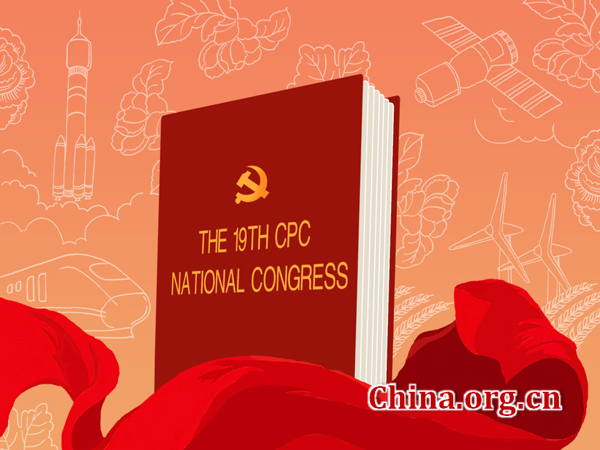A sober judgment for the new era
- By Zheng Yongnian
 0 Comment(s)
0 Comment(s) Print
Print E-mail China.org.cn, November 2, 2017
E-mail China.org.cn, November 2, 2017
 |
|
The road map drawn up by the 19th CPC National Congress to guide China's future development is equally valuable for other countries that seek a new way to develop. [China.org.cn] |
When the Communist Party of China (CPC) holds its national congress every five years, the most important issue is to answer three questions concerning where we come from, where we have been, and where we will go. The 19th CPC National Congress was no exception.
These three questions involve a basic judgment, and a basic judgment is of the utmost importance. The Communist Party of China is, at heart, a party of mission. Only by making these basic judgments can it define new missions and shape future directions of its development.
In 1949, the CPC, led by Mao Zedong, completed the most arduous modern task of establishing a new China. In the following 30 years, a basic national political system was established. After China entered the new period of reform and opening up, Deng Xiaoping put forward the concept of a socialist market economy, an important part of the Deng Xiaoping Theory.
The 13th CPC National Congress created the basic roadmap of the Party in the primary stage of socialism. In 1992, Deng Xiaoping's talk during his southern China tour again stressed that this would take a hundred years to complete.
New era, new judgment, new mission. Now, China has moved into a new era. This is not a new term; however, it is new in the aspect of being a new basic judgment made by the CPC based on China's social-economic development level reaching a certain stage where the development is neither balanced nor adequate.
The report delivered by Xi Jinping at the 19th CPC National Congress pointed out: "As socialism with Chinese characteristics entered a new era, the principal contradiction facing Chinese society has also evolved. What we now face is the contradiction between unbalanced and inadequate development and the people's ever-growing need for a better life."
At the same time, the change of the principal socioeconomic contradiction does not change the judgment of the CPC in regard to the historical stage at which Chinese socialism now finds itself. The basic national situation, where China will remain in a primary stage of socialism for a long time, is not changed. China is the world's largest developing country and its international status has not changed in that regard.
Although China has made great achievements in the development, winning much applause from the international community, China also clearly understands in what era it finds itself, as well as the internal and external environments.
Socialism is not promoted by beating gongs and drums. The leadership of the CPC is very sober-minded. On the basis of fully affirming the achievements made so far by their own efforts, they face the fresh challenges and look to the future, with serious and calm thinking and judgments about the problems faced.
Xi Jinping depicted the future blueprint in his 19th CPC National Congress report: The period between the 19th and the 20th CPC National Congress is the one in which the timeframes of two centenary goals converge. In this period, not only must we finish building a moderately prosperous society in all aspects to achieve the first centenary goal; we must also build on this achievement to embark on a new journey toward the second centenary goal of fully building a modern socialist country.
The blueprint is based on the basic judgment. Economically speaking, China has reached the stage of achieving a decisive victory in building a moderately prosperous society in all aspects. From the policy discussions over these past years, the focus has been how to avoid the "middle income trap," and take the country forward to an upgrade platform involving a high-income economy, which means, a rich society.
China's current per capita gross domestic product (GDP) is more than US$8,000, and will reach US$12,000 by 2020, according to the 13th Five-Year Plan (2016-2020). More importantly, when Chinese people have enough food and clothing and achieve the goal of overall realization of a moderately prosperous society, then other needs, such as enjoying a beautiful environment, social equity and justice, will be given greater priority.
This further indicates the unbalanced and inadequate development between China's economy and society, between economy and the environment, and between material and cultural and ethical dimensions. That is why the 19th CPC National Congress report proposed "to promote well-rounded human development and all-round social progress."
However, the new judgment made by the CPC in the new era is not only about the development of China itself; it is also a brand-new option offered for the countries and peoples of the world who wish to accelerate development and maintain their independence.
The author is the director of the East Asian Institute at the National University of Singapore.
The article was written in Chinese and translated by Zhang Rui.
Opinion articles reflect the views of their authors, not necessarily those of China.org.cn.





